RIGHT TO FOOD AND NUTRITION WATCH
1iNBHTY
1iNBHTY
Create successful ePaper yourself
Turn your PDF publications into a flip-book with our unique Google optimized e-Paper software.
01<br />
THE CORPORATE CAPTURE OF <strong>FOOD</strong> <strong>AND</strong> <strong>NUTRITION</strong> GOVERNANCE:<br />
A THREAT <strong>TO</strong> HUMAN <strong>RIGHT</strong>S <strong>AND</strong> PEOPLES’ SOVEREIGNTY<br />
safe and healthy diet to all in line with their cultural and religious practices. This<br />
would help guarantee that all human beings can reach their full human potential. 38<br />
This form of corporate capture, therefore, represents a ‘life grab’.<br />
Clear signs of this threat were observed during the preparatory and follow-up<br />
processes to the Second International Conference on Nutrition (ICN2), held in Rome<br />
in November 2014, including in its final document and in the governance of the food<br />
and nutrition policy spaces. Civil society clearly proposed that the CFS should be the<br />
overarching intergovernmental policy space to harmonize and coordinate food and<br />
nutrition policies. They also suggested that the WHO and FAO intergovernmental<br />
governing bodies should coordinate the normalization, regulatory and standard setting<br />
initiatives for food and nutrition. Civil society further stipulated that an SCNlike<br />
body should facilitate the global and national harmonization of food and nutrition<br />
policies, elaborate and implement the necessary programs, and report to the<br />
intergovernmental bodies of WHO, FAO, CFS and UN General Assembly (UNGA).<br />
These bodies must all act in accordance with the human rights framework, and follow<br />
strict procedures to prevent and confront conflicts of interest. However, in early<br />
2015, different allies of SUN clearly attempted to increase the visibility and role of<br />
SUN in the CFS, and in the overall structure of the UN, including by trying to consolidate<br />
the Secretariat of the UN SUN network in the WFP. The Gates Foundation<br />
also made incursions in the CFS process. 39 At the time of writing, the outcome was<br />
still unclear.<br />
The corporate capture of nutrition strengthens the instrumentalization of<br />
women’s role as mothers and providers of food and nutrition to their families in the<br />
name of ‘empowering’ women. 40 In reality this pushes women further away from<br />
real emancipation. To prevent this, emphasis must be placed on the complete fulfillment<br />
of human rights throughout the life cycle of women on an equal footing with<br />
men and independent of their role as mothers. They must be guaranteed the right<br />
to make their own decisions, gender equality, study, work, receive equal pay, have<br />
access and control over land, choose their partners and jointly decide whether and<br />
when they want to become mothers.<br />
For all these reasons, and taking into account the need to face this corporate<br />
capture of the food and nutrition policy space, and of the right to food, FIAN International,<br />
the social movements and civil society organizations that constitute the<br />
Global Network for the Right to Food and Nutrition (GNRFN) 41 have interpreted<br />
the right to adequate food and nutrition as embedding food sovereignty, the full<br />
realization of women’s human rights, and the indivisibility of all human rights. This<br />
revised conceptual framework of the right to adequate food returns the ownership<br />
of human rights to the peoples. It is in full accordance with the Universal Declaration of<br />
Human Rights and includes all the present demands of the food sovereignty movement.<br />
It is also a useful analytical tool to bring together national, regional and global social<br />
struggles capable of creating another world based on gender equality, equity, justice,<br />
non-discrimination, human dignity, and participatory democracy to put an end to all<br />
forms of exploitation.<br />
38 For more articles on food sovereignty, please<br />
see: Claeys, Priscilla. “From Food Sovereignty<br />
to Peasants’ Rights: An Overview of Via<br />
Campesina’s Struggle for New Human<br />
Rights.” In La Via Campesina’s Open Book:<br />
Celebrating 20 Years of Struggle and Hope.<br />
Jakarta: La Via Campesina, 2013; Fairbairn,<br />
Madeleine. “Framing Resistance: International<br />
Food Regimes and the Roots of<br />
Food Sovereignty.” In Food Sovereignty:<br />
Reconnecting Food, Nature & Community, edited<br />
by Hannah Wittman, Annette Desmarais, and<br />
Nettie Wiebe, 15–32. Halifax: Fernwood<br />
Publishing, 2010; Windfuhr, Michael and<br />
Jennie Jonsén. Food Sovereignty: Towards<br />
Democracy in Localized Food Systems. Warwickshire:<br />
ITDG Publishing and FIAN, 2005.<br />
39 In 2014, the Bill & Melinda Gates Foundation<br />
provided a grant of USD $745,473 to the<br />
Secretariat of the CFS to support the discussion<br />
of Food and Nutrition Governance. For<br />
more information, see: www.gatesfoundation.<br />
org/How-We-Work/Quick-Links/Grants-<br />
Database/Grants/2014/06/OPP1103948.<br />
The draft document CFS and its role advancing<br />
Nutrition (CFS, BurAG2015/02/02/03),<br />
presented in February 2015 to the CFS<br />
Bureau focuses, to a large extent, on how the<br />
CFS could strengthen SUN, a PPP supported<br />
by the same foundation. Available at:<br />
www.csm4cfs.org/files/News/216/cfs_bur_ag_<br />
2015_03_02_03_cfs_and_its_role_advancing_<br />
nutrition_(1).pdf<br />
40 For a detailed description of the instrumentalization<br />
of women by traditional food security<br />
policies and the food sovereignty framework<br />
for the human right to adequate food and<br />
nutrition, please see: Anne C. Bellows et al.,<br />
Gender, Nutrition and the Human Right to<br />
Adequate Food: Towards an Inclusive Framework.<br />
New York: Taylor & Francis/Routledge,<br />
forthcoming. See also Córdova Montes,<br />
Denisse and Flavio Luiz Schieck<br />
Valente. “Interdependent and Indivisible:<br />
The Right to Adequate Food and Nutrition<br />
and Women’s Sexual and Reproductive<br />
Rights.” Right to Food and Nutrition Watch<br />
(2014): 32–33. Available at: www.rtfn-watch.<br />
org/fileadmin/media/rtfn-watch.org/ENGLISH/<br />
pdf/Watch_2014/Watch_2014_PDFs/<br />
R_t_F_a_N_Watch_2014_eng.pdf#page=32.<br />
41 See the Global Network for the Right to food<br />
and Nutrition Charter. Geneva/Vienna:<br />
GNRtFN, 2013. Available at:<br />
www.fian.org/fileadmin/media/publications/<br />
GNRtFN_-_Formatted_Charter.pdf.<br />
Peoples’ Nutrition Is Not a Business 19


